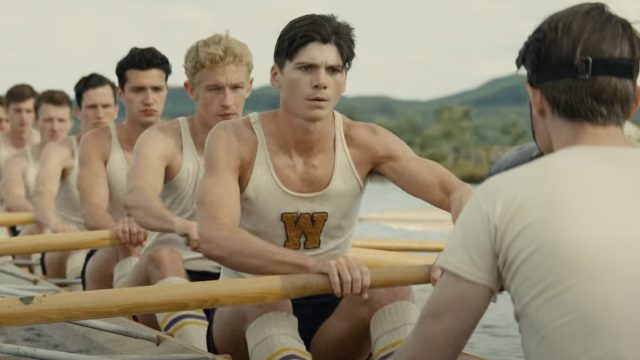In the hazy muted tones of The Great Depression, Joe Rantz attends engineering school at the University of Washington. For now. He’s living out of a car, eating canned beans as he studies a textbook in its backseat and he’s been told he’d better come up with some scratch for tuition or “seek educational opportunities elsewhere” (the idea of yoking him to a lifetime of impossible debt hasn’t been introduced to circles of higher learning yet). Finding no traditional employment among the shabby flat-hatted masses, Joe tries out for the lucrative UW rowing team. In the first of many, many montages of men rowing together, Joe discovers how taxing rowing crew can be on the body. Will he make the team? Spoiler: not a single moment in this story will surprise you.
Many wonderful movies have been made about foreknown incidents; it’s not what happens but how it’s presented. And that’s where The Boys in the Boat distinguishes itself as a bad movie and not just a simple one. For example, a radiant Hadley Robinson desperately attempts to breathe life into the character Joe’s girl, Joyce – these designations are presented here in their proper order. She’s introduced reminding him that he’s had a crush on her since the fourth grade, and endures such dramatic waves as waiting for Joe to make a move, enjoying Joe’s company, putting up with Joe when he becomes frustrated and surely, and reacting to Joe’s races. This could be sexist writing of a paper-thin character, but Joe’s teammates get barely anything better. If Daniel James Brown’s book posited a Washington crew with only one inner life between them, some dramatic license would be appreciated.
There’s retro and then there’s retrograde, and this movie has been made dozens of times, Based on a True Story or not. It’s annoying to see Clooney squander his clout to make something that already existed in several forms, except worse. I’m not expecting the last classical movie star to stay on the forefront of cinematic invention (remember Confessions of a Dangerous Mind?), but The Boys in the Boat would have seemed dated in the 90s. What if instead of making Ordinary People in 1980, Robert Redford threw his weight behind recreating an early playhouse talkie?
In something of a departure for its director, Boys only lazily stretches in the direction of sociopolitical relevance. We need villains, of course, so the movie pits Washington in a must-win competition with Pacific rival University of California-Berkley. Cal has more money and resources and has beaten UW several years running and the boosters are getting antsy for a win, especially in an Olympic-qualifying year. How to raise the stakes after that victory? An even bigger race with an even larger group of rich bastards in the Ivy League. And then what could be worse than Ivy Leaguers? Nazis!
Yes, the qualifying team (wouldn’t dream of telling you which one it is) takes its stroke act into the heart of Nazi Germany at the 1936 Berlin Olympics. Accurately, if inert dramatically, much of the world was still figuring out its feelings on this Third Reich business at this time, and the movie doesn’t portray the meaning of this competition for the Boys penetrating much beyond any athlete’s desire for first place. Frankly, these ranks of generic muscular blonde men don’t seem like they would displease Hitler all that much, and positioning the milquetoast lads as inspiring historical figures defying Der Führer would be a big task, especially when they are literally standing next to Jesse Owens. So give the movie credit for not trying very hard.
Instead we simply get our third major boat race of the movie. It takes the same form as the first two – a helpful play-by-play announcer accompanying increasingly rapid cuts between Joe, oars, the coxswain, the coach sweating and looking at his stopwatch, the crowd, Joyce listening on the radio, etc, etc, etc. Except this time include shots of a nervous Hitler in the rotation. Perhaps it’s accurate to imagine Hitler white-knuckling his way through a regatta, but it’s undeniably true that adding Hitler reaction shots to your sports montage creates comedy gold.
The Boys in the Boat meant to inspire pride rather than giggles. But when the movie lovingly moves its camera across each of those boys at the finale and reveals that less than half have made any kind of impression, laughter is the only compensation left for the past two hours. This is every old-fashioned competition cliche sanded down to an aerodynamic frame, the better to skim across your attention without leaving a ripple.


